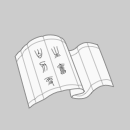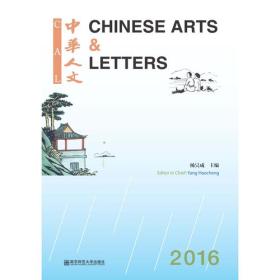
中华人文
全新正版 极速发货
¥ 38.52 4.4折 ¥ 88 全新
库存2件
广东广州
认证卖家担保交易快速发货售后保障
作者杨昊成 主编
出版社江苏译林出版社有限公司
ISBN9787544773416
出版时间2018-04
装帧平装
开本16开
定价88元
货号1201716817
上书时间2024-06-19
- 最新上架
商品详情
- 品相描述:全新
- 商品描述
-
作者简介
杨昊成,江苏宜兴人,1963年生。博士,教授,江苏省外国文学学会会员,江苏省外国语言学会会员,南京市翻译家协会会员,南京师范大学外国语学院美国文明研究所所长,全英文期刊Chinese Arts and Letters(《中华人文》)主编。
目录
Editor’s Note
by Yang Haocheng (杨昊成)
Featured Author: Ye Mi (叶弥)
Bright Moon Temple (《明月寺》)
Snowflake Meditation (《雪花禅》)
Mount Xianglu (《香炉山》)
Critique
The Enlightened Way of Fiction by Zhang Xuexin (张学昕)
Interview
An Interview with Ye Mi by Jin Ying (金莹)
Culture & Heritage
The Essentials of Chinese Calligraphy by Yang Haocheng (杨昊成)
Echoes of Classics
Introduction to Laozi and His Daodejing by Bill Porter
Selections from Daodejing
Short Stories
Wealth, Blessings and Longevity (《福禄寿》) by Pang Yu(庞羽)
Prose
Bluestone Alleys (《青石小街》) by Fei Zhenzhong (费振钟)
Rain in the Old Village (《古村的雨》) by Fei Zhenzhong(费振钟)
Poems
Poems by Hu Xian (胡弦)
Art
Coffee Pot or Water Jug? by Shen Li (沈黎)
内容摘要
杨昊成主编的《中华人文(2018靠前辑)》是一本译介中国当代作家作品兼顾中国当代艺术的全英文图书。本书以兼容并蓄的精神择选稿件,旨在向英语世界译介中华人文,特别是中国当代文学创作的很好成果,弘扬中华人文精神,促进中华文化交流。
本辑主推作家是叶弥,共收录了叶弥的三篇短篇小说《明月寺》《雪花禅》和《香炉山》》、一篇访谈和一篇评论。
精彩内容
【序言】To be frank, I started reading Ye Mi (叶弥) only a little over three years ago when she was recommended to me by both Su Tong (苏童) and Fan Xiaoqing (范小青), who said that she was a writer of real narrative power with a unique style of her own. The first story I read of hers and then published in CAL is“Family,” one that is vastly different from others in that it smacks of a strong flavor of the ambiance prevalent in the writings of the Republican period of China. Her mind seems to me to be totally engrossed in a serene world far away from the madding crowd of today. Mountains and flowers, temples and monasteries, the bright moon and a sprinkling of lonely, leisurely souls—all these seem to have made up the entire world of her literary landscape. She is instinctively attached to these things and people and seems to have little interest in what is going on in this world of mundane existence. I’ve always been wondering what could possibly be the reason behind this literary preference of hers. Then I was reminded of her retreat from the city to the countryside a few years ago, where she preferred a self-contained, rustic life with her patches of vegetables and fruit trees and flocks of fowls and pets. Ye Mi is my age and not that old to retire to the country like China’s reputed recluses of the olden days when they had either suffered enough setbacks in the realistic world, or when they were tired of the schemes and struggles of the outside world and dreamed of withdrawing to the mountains and waters for an unperturbed life. Ye Mi seems to fit into neither category. But then who knows! What I do know is that the female author is very happy with what she has and what she is. She is at present the proud master of her own house at the side of the Taihu Lake, now working in the fields, now walking with her cherished pets, but most of the time peacefully working away at her letters. Starting this issue, CAL has a new column added to it:“Echoes of Classics.” We’ll pick and choose those cultural and literary gems throughout the history of Chinese civilization from Laozi’s Daodejing, Confucius’ Analects, the pre-Qin prose, the works of the Pléiade of the Bamboo Grove, Tang and Song poetry, Yuan drama, Ming and Qing fiction, all the way down to the May 4th literary masterpieces. For Daodejing, which is the first on our long list and is known to have been the most translated Chinese classic with one hundred versions or so in English alone, we hesitated a lot as to which of these renditions to choose. James Legge? Frederic Henry Balfour? Witter Bynner? Arthur Waley? Lin Yutang (林语堂)? Or D.C. Lau (刘殿爵)? All towering figures in sinology or literary translation, but finally we came down to Bill Porter, a.k.a. Red Pine, a name with some Zen implication in it which Porter adopted for himself after more than a dozen years of life and work in Taiwan and Hong Kong. His rendition of Daodejing, using simple enough English to capture the austere and sometimes elusive meaning of the original text, impresses me as having the advantage of better fluidity in reading and easier accessibility to the modern reader. What is more noteworthy is his eclectic selection from the ocean of literary commentaries and exegeses on Daodejing throughout Chinese literary history which is yet another sure evidence of Porter’s extensive reading and rigorous scholarship. Dadejing, like The Analects, with its colloquial style, is relatively a simple text, but translating it is by no means easy. That’s why the Canadian sinologist W.A.C.H. Dobson, whose translation of Mencius won him world-wide accolade, said that it was time for a sinologist to retire when he announced that he was working on a new version of Daodejing. We don’t know exactly what is behind Dobson’s words, but we are moved by Porter’s courage to take up the challenge of translating this Daoist classic at an age when most people would prefer a cozy, retired life with their family and yet he decided to follow the dictates of his heart and set his mind on burning the long, solitary midnight oil.One of the problems prior to translating Daodejing is that the translator will come across different versions of the text, including different punctuations, for throughout the ages, the text of Daodijing underwent numerous recensions and each would claim itself to be authentic. This alone will result in different enough interpretations and accordingly, divergent renditions. I take this to be quite normal with most ancient texts. Porter&n
相关推荐
— 没有更多了 —


















以下为对购买帮助不大的评价